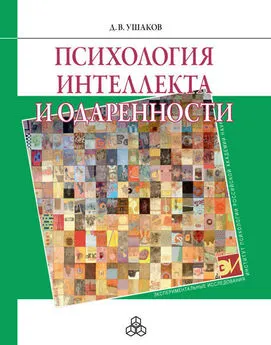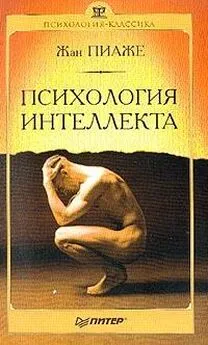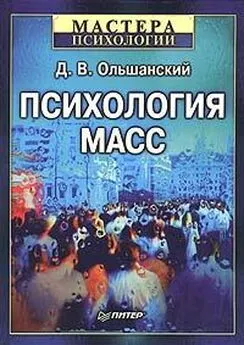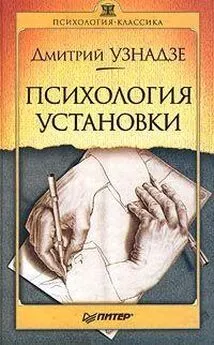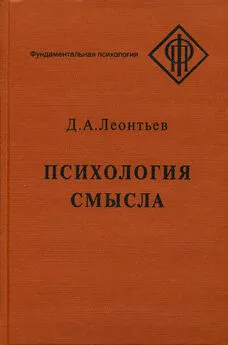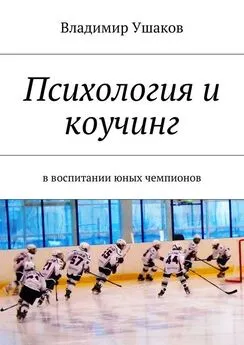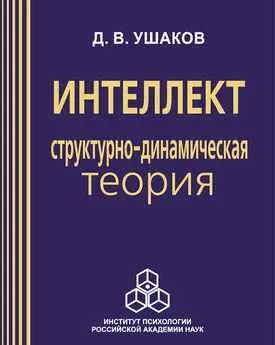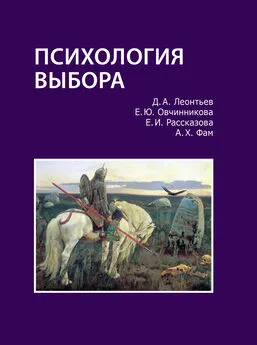Дмитрий Ушаков - Психология интеллекта и одаренности
- Название:Психология интеллекта и одаренности
- Автор:
- Жанр:
- Издательство:Литагент «Когито-Центр»881f530e-013a-102c-99a2-0288a49f2f10
- Год:2011
- Город:Москва
- ISBN:978-5-9270-0218-4
- Рейтинг:
- Избранное:Добавить в избранное
-
Отзывы:
-
Ваша оценка:
Дмитрий Ушаков - Психология интеллекта и одаренности краткое содержание
Монография посвящена проблемам интеллекта, творчества, одаренности. В ней представлен современный этап развития структурно-динамической теории интеллекта, предлагается новый подход к исследованию и практической работе в области одаренности. Особое место отводится школе психологии творчества, основанной Я. А. Пономаревым, и сопоставлению сформулированных в ее русле идей с достижениями современных зарубежных исследователей.
Психология интеллекта и одаренности - читать онлайн бесплатно ознакомительный отрывок
Интервал:
Закладка:
Ludwig A. M. Creative achievement and psychopathology: Comparison among professions // American Journal of Psychotherapy. 1992. 46. P. 330–356.
Lynn R. The social ecology of intelligence in the British Isles // British Journal of Social and Clinical Psychology. 1979. 18. P. 1–12.
Lynn R. The social ecology of intelligence in France // British Journal of Social and Clinical Psychology. 1980. 19. P. 325–331.
Lynn R. The social ecology of intelligence in the British Isles, France and Spain // M. P. Friedman, J. P. Das and N. O’Connor (eds). Intelligence and Learning. N. Y.: Plenum, 1981.
Lynn R. Eugenics: a reassessment. Westpoint: Praeger Publishers, 2001.
Lynn R., Vanhanen T. IQ and the Wealth of Nations. Westport, CT: Praeger Publishers, 2002.
McClelland D. C. The achieving society. Princeton, NJ: Van Nostrand, 1961.
McClelland D. C. The United States and Germany: A comparative study of national character // Roots of consciousness / D. C. McClelland (ed.). 1964. Princeton, NJ: Van Nostrand, P. 62–92.
McHenry J. J., Hough L. M., Toquam J. L., Hanson M. A., Ashworth S. Project A validity results: The relationship between predictor and criterion domains // Personnel Psychology. 1990. 43. P. 335–354.
Mackintosh N. J. IQ and human intelligence. Oxford, UK: Oxford University Press, 1998.
Maier N. R. F. Reasoning in humans. The solution of a problem and its appearance in consciousness // P. C. Wason. P. N. Johnson-Laird (eds). Thinking and reasoning. Penguin Books, London. 1972. P. 17–27.
Maker C. J. Identification of gifted minority students: A national problem, needed changes and promising solution // Gifted Child Quarterly. 1996. 40. P. 41–50.
Manza L., Reber A. C. Representing artificial grammars: Transfer across stimulus forms and modalities // Berry D. (Ed.) How implicit is implicit learning. N. Y.: Oxford University Press, 1997. P. 73–106.
Marendaz C. Selection of the reference frame and the “vicariance” of perceptual system // Perception. 1989. 18. P. 739–751.
Markman E. M. Empirical versus logical solutions to part – whole comparison problems concerning classes and collections // Child development. 1978. 49. P. 168–179.
Marland S. Education of the gifted and talented: Report to Congress. Washington, DC: U. S. Office of Education, 1972.
McCarthy D. McCarthy Scales of Children Abilities. San Antonio, Tex.: Psychological Corporation, 1972.
McClearn G. E., Johansson B., Berg S., Pedersen N. L., Ahern F., Petrill S. A., Plomin R. Substantial genetic influence on cognitive abilities in twins 80+ years old // Science. 1997. 276. P. 1560–1563.
McClelland D. C. The achieving society. Princeton, NJ: Van Nostrand, 1961.
McClelland D. C. The United States and Germany: A comparative study of national character // D. C. McClelland (ed.). Roots of consciousness. Princeton, NJ: Van Nostrand, 1964. P. 62–92.
McClelland D. C., Baldwin A. L., Bronfenbrenner U., Strodtbeck F. L. Ta lent and society. Princeton, NJ: Van Nostrand, 1958.
McGraw M. Growth: a study of Johnny and Jimmy. N. Y.: Appleton-Century-Crofts, 1935.
McGue M., Bouchard T. J., Iacono W. G., Lykken D. T. Behavioral genetics of cognitive ability: A life-span perspective // R. Plomin, G. E. McClearn (eds). Nature, nurture and psychology. Washington, DC: APA, 1993. P. 59–76.
Mednick S. A., Mednick M. T. An associative interpretation of the creative process // C. W. Taylor (ed.). Widening horizons in creativity. N. Y.: Wiley, 1964 P. 54–68.
Meeker M. The structure of intellect: Its interpretation and uses. Columbus, OH: Charles E. Merrill, 1969.
Meeker M., Meeker R. SOI learning abilities test (rev. ed.). El Segundo, CA: SOI Institute, 1969.
Mendelsohn G. Associative and attentional processes in creative performance // Journal of Personality. 1976. 44. P. 341–396.
Mendelsohn G., Griswold B. Differential use of incidental stimuli of problem solving as a function of creativity // Journal of Abnormal and Social Psychology. 1964. V. 68. № 4. P. 431–436.
Mill J. S. Autobiography. London: Oxford University Press, 1971.
Mimo M., Cantor J. H., Riley C. A. The development of representation skills in transitive reasoning based on relations of equality and inequality // Child Development. 1983. 54. P. 1457–1469.
Moffitt T. E., Caspi A., Harkness A. R., Silva P. A. The natural history of changes in intellectual performance: Who changes? How much? Is it meaningful? // Journal of Abnormal Psychology. 1993. 90. P. 152–156.
Moles A. Information theory and esthetic perception. Urbana: University of Illinois Press, 1968.
Monteil J.-M. Eléments pour une exploration des dimensions du conflit socio-cognitif: une expérimentation chez l’adulte // J.-L. Beauvois, R.-V. Joule, J.-M. Monteil (eds). Perspectives cognitives et conduites sociales. 1. Théories implicites et conflits cognitifs. Suisse, Cousset: Del Val. 1987. P. 499–518.
Neisser U. Memory observed. N. Y.: Freeman, 1982.
Newell A. Dunker on thinking: An inquiry into progress in cognition // S. Koch, D. Leary (eds). A Century of Psychology as Science: Retrospections and Assessment. N. Y.: McGraw-Hill, 1981.
Nguyen-Xuan A. Apprentissage par l’action d’un domaine de connaissance et apprentissage par l’action du fonctionnement d’un dispositif de commande // J.-M. Hoc, P. Mendelsohn (eds). Les language informatiques dans l’enseignement. 1988.
Nuttall R. L. Some correlates of high need for achievement among urban northern Negroes // Journal of Abnormal Social Psychology. 1964. 68. P. 593–600.
Ohlmann T. Processus vicariants et théorie neutraliste de l’évolution: une nécessaire convergence // J. Lautrey (ed.). Universel et Différentiel en Psychologie. Paris: PUF, 1995.
Page E. B., Grandon G. M. Family configuration and mental ability: two theories contrasted with U. S. data // American Educational Research Journal. 1979. 16. P. 257–272.
Pagès R. Navette d’échelles en sociopsychologie politique // Bulletin de psychologie. 15. 1986. 379. P. 233–250.
Pagès R. L’intelligence entre le confit et l’aménité: à propos du conflit sociocognitif // J.-L. Beauvois, R.-V. Joule, J.-M. Monteil (eds). Perspectives cognitives et conduites sociales. 1. Théories implicites et conflits cognitifs. Suisse, Cousset: Del Val, 1987. P. 249–284.
Pagès R. La société humaine n’étant pas une termitiére vit de psychodiversité dans la biodiversité // Communication au 2-e congrès international d’Eurotalent. Milan-Vercelli, 1993.
Pagès R., Derghal M. Reduire ou faciliter l’expression de l’idiosyncrasie individuelle: concepts et esquisse experimentale // Bulletin de Psychologie. 1984. 37. 11–14. P. 695–711.
Pasqual-Leone J. Organismic processes for neo-Piagetian theories: a dialectical causal account of cognitive development // International Journal of Psychology. 1987. 22. P. 25–64.
Pedersen N. L., Plomin R., McClearn G. E. Is there G beyond g (is there genetic influence on specific cognitive abilities independent of genetic influences on general cognitive ability?) // Intelligence. 1994. 18. P. 133–143.
Pegnato C., Birch J. Locating gifted children in junior high school // Exceptional children. 1959. 25 (7). P. 300–304.
Perner J. Understanding the representational mind. Cambridge, London: MIT Press, 1991.
Perner J., Steiner G., Staehelin C. Mental representation of length and weight series and transitive inferences in young children // Journal of Experimental Child Psychology. 1981. 31. P. 177–182.
Piaget J. Cognitions and conservations: two views // Contemporary Psychology. 1967. 12. P. 532–533.
Piaget J. Quantification, conservation and nativism // Science. 1968. 162. P. 976–979.
Piaget J., Inhelder B. La representation de l’espace chez l’enfant. Neuchatel: Delachau, Niestlé, 1947.
Planche P. Modalites fonctionnelles et conduites de resolution de problémes chez l’enfant de cinq, six et sept ans d’age chronologique // Archives de psychologie. 1985. 53. 207. P. 411–415.
Planche P. Precocite intellectuelle: fonctionnement cognitif et dysharmonie // Actes du XXVIe congrés de psychologie a Montreal. International journal of psychology. 1996. 31. P. 371.
Planche P. La construction des notions spatiales chez les enfants intellectuellement precoces, ages de 6 a 8 ans // Enfance. 1998. 2. P. 159–171.
Planche P. Les strategies de décentration centration spatio-cognitive chez les enfants intellectuellement précoces de 6 ans // Bulletin de psychologie. 1999. 52 (4). P. 473–480.
Plomin R. Development, genetics and psychology. Lawrence Erlbaum Ass., 1986.
Plomin R., DeFries J. C. A parent-offspring adoption study of cognitive abilities in early childhood // Intelligence. 1985. 9. P. 341–356.
Politzer G., Nguyen-Xuan A. Reasoning about conditional promises and warnings: Darwinian algorithms, mental models, relevance judgements or pragmatic schemas? // Quarterly Journal of Experimental Psychology. 1992. 44 (3). P. 401–421.
Pollins L. D. The effects of acceleration on the social and emotional development of gifted students // C. P. Benbow, J. C. Stanley (eds). Academic precocity. Baltimore, MD: Johns Hopkins University Press, 1983. P. 160–178.
Posner M. I., Mitchell R. F. Chronometric analyses of classification // Psychological Review. 1967. 74. P. 392–409.
Price D. Little science, big science. N. Y.: Columbia University Press, 1963.
Raven J. A model of competence, motivation and behavior and a paradigm for assessment // H. Berlak (ed.). Assessing academic achievement: issues and problems. 1991.
Reber A. S. Implicit learning of artificial grammars // Journal of Verbal Learning and Verbal Behavior. 1967. V. 6. P. 855–863.
Reber A. S. Transfer of syntactic structure in synthetic languages // Journal of Experimental Psychology. 1969. V. 81. P. 115–119.
Reber A. S. Implicit learning of synthetic languages: The role of instructional set // Journal of Experimental Psychology: Human Learning and Memory. 1976. V. 2. P. 88–94.
Reber A. S. Implicit learning and tacit knowledge: An essay on the cognitive unconscious. N. Y.: Oxford University Press, 1993.
Record R. G., McKeown T., Edwards J. H. The relation of measured intelligence to birth order and maternal age // Annals of Human Genetics. 1969. 33. P. 61–69.
Renzully J. S., Reis S. M. The Schoolwide Enrichment Model. A how-to guide for educational excellence. Connecticut: Creative Learning Press, Inc., 1997.
Retherford R. D., Sewell W. H. Birth order and intelligence: Further tests of the confluence model // American Sociological Review. 1991. 56. P. 141–1 5 8.
Reuchlin M. Processus vicariants et différences individuelles // Journal de psychologie. 1978. 2. P. 133–145.
Riley C. A., Trabasso T. Comparative logical structures and encoding in a transitive inference task // Journal of Experimental Child Psychology. 1974. 17. P. 187–203.
Rips L. Deduction // R. J. Sternberg, E. E. Smith (eds.) The psychology of human thought. Cambridge: Cambridge University Press, 1991. P. 116–153.
Читать дальшеИнтервал:
Закладка:
